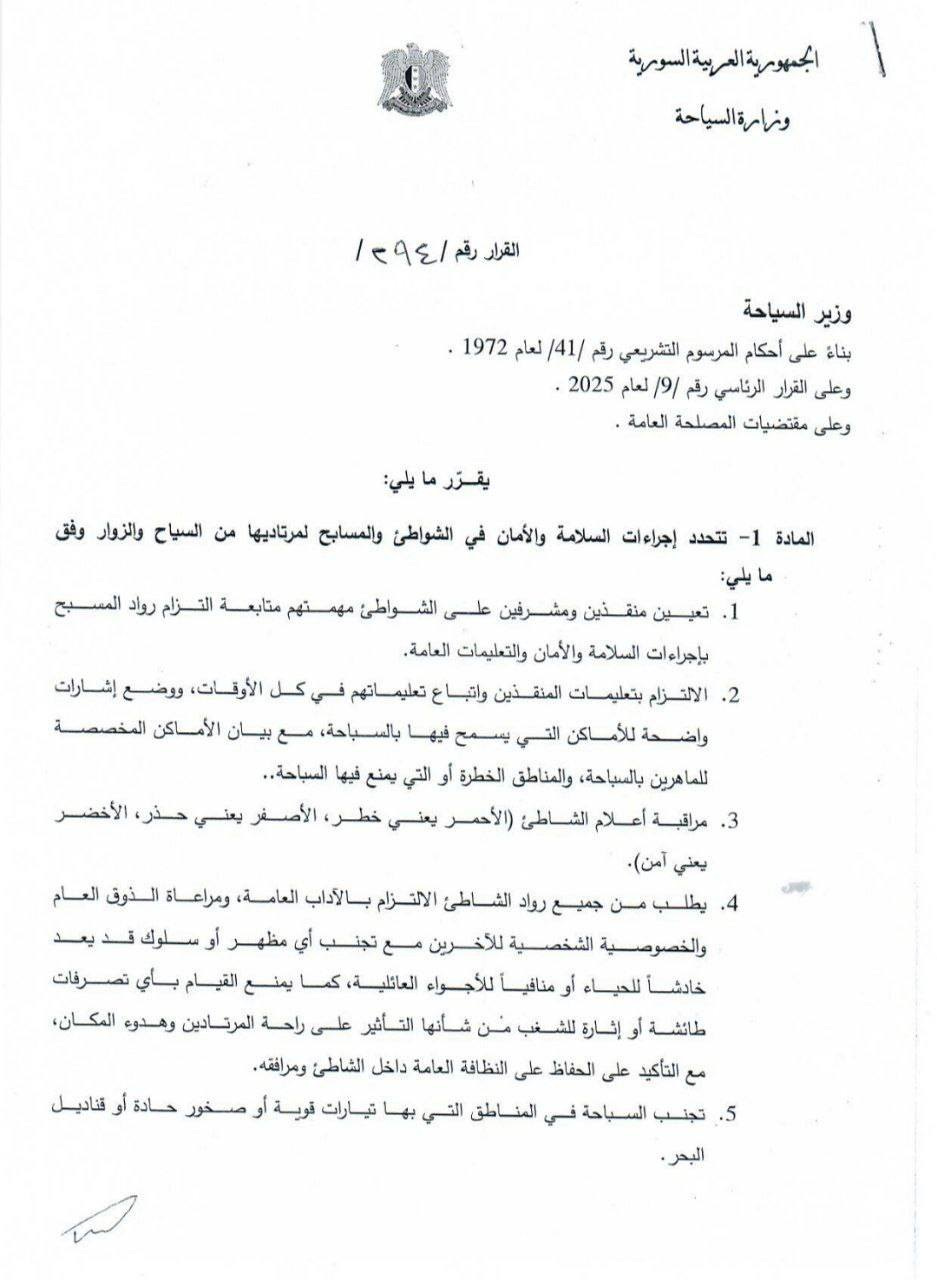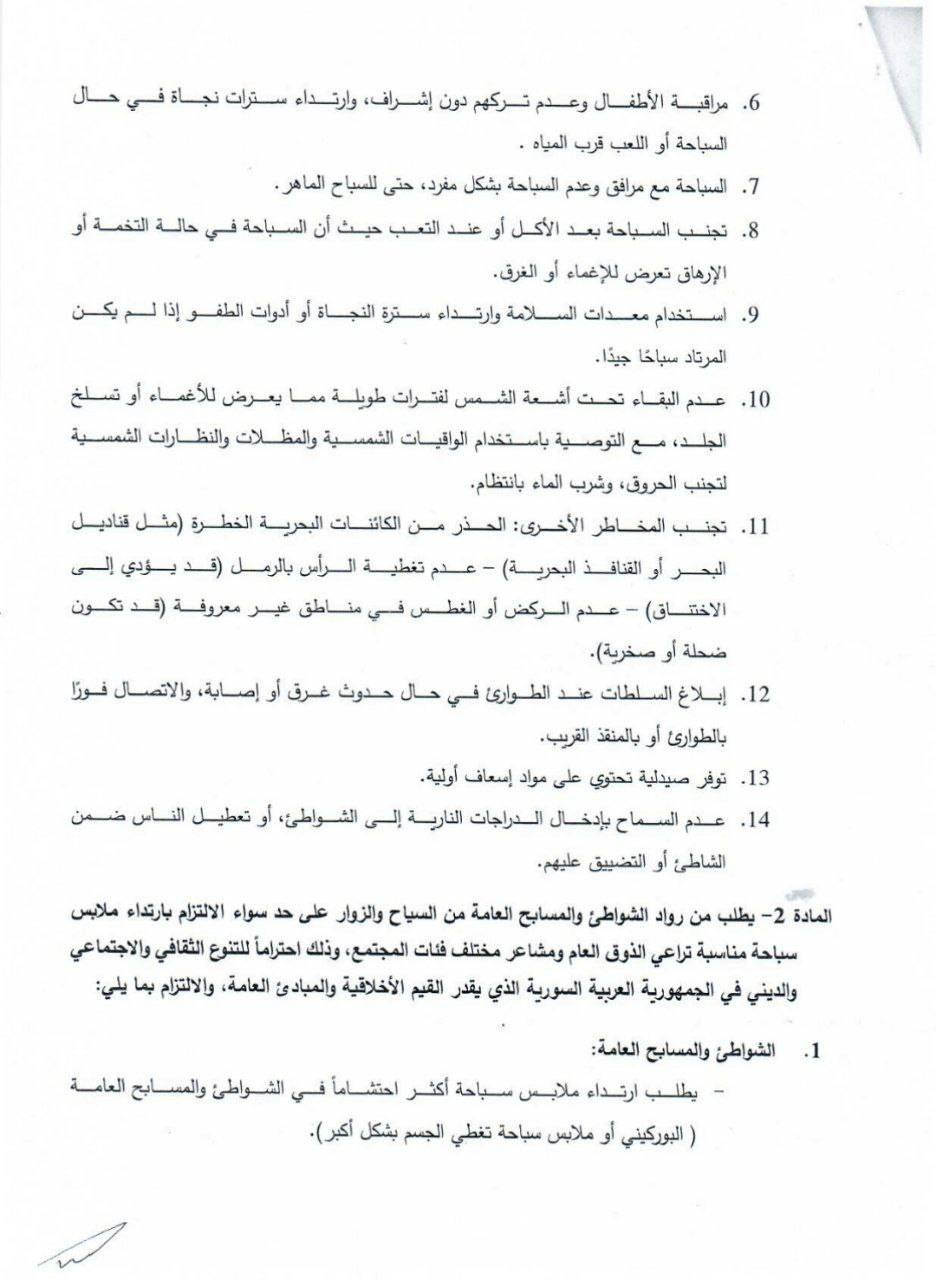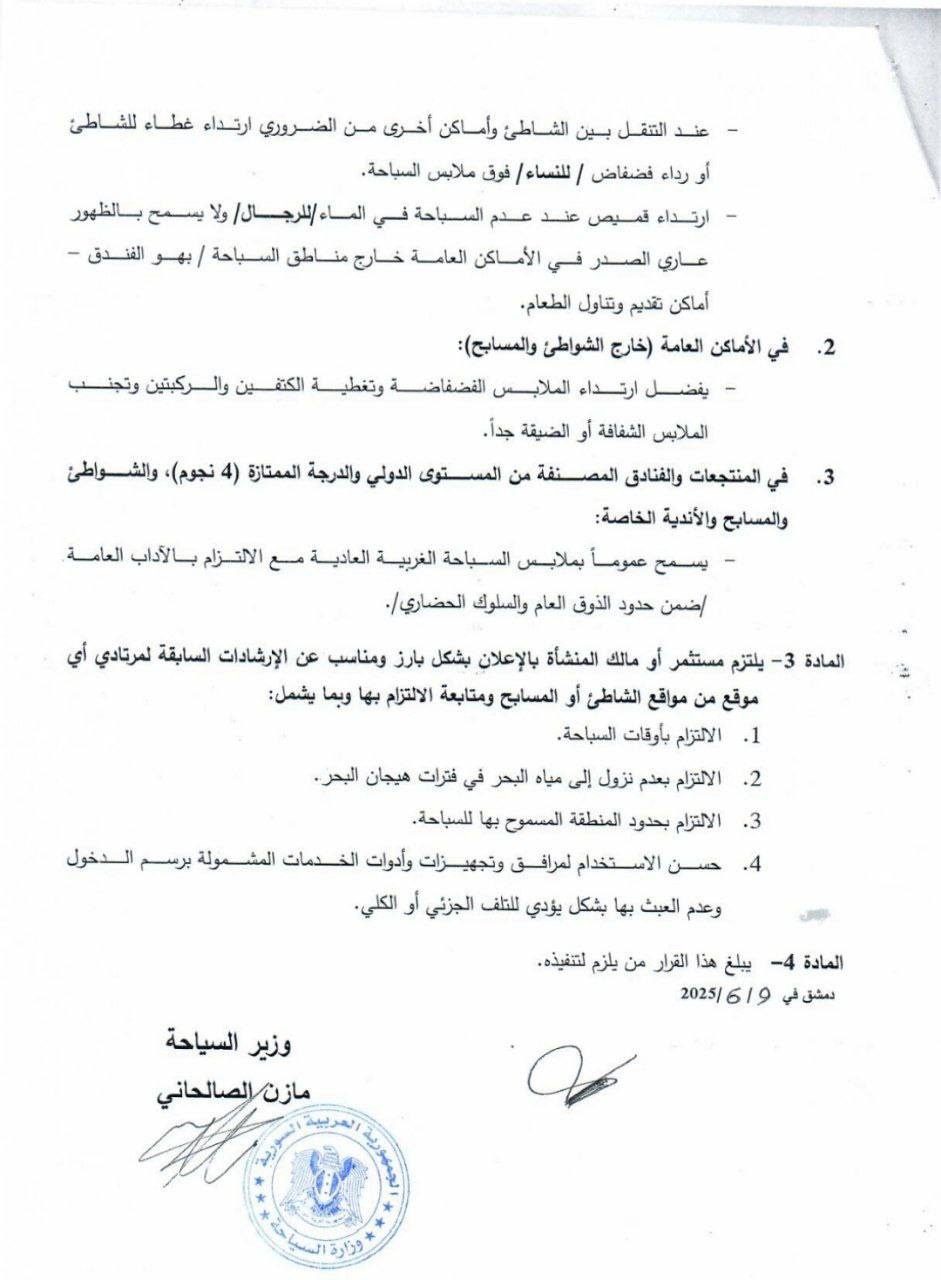Syrian Ministry of Tourism Guidelines and Rules on Beaches, Pools and Clothing
Translation and Overview
The Syrian Ministry of Tourism has published a new set of guidelines and rules on the use of beaches and pools in particular. Many of these guidelines and rules are common-sense in nature (e.g. observing flag indications on the beach, such as the red flag signalling that the seas are dangerous). However, other rules simply reflect the fact that the new government has principally sprung out of Hay’at Tahrir al-Sham (whose foundations lie in Salafi Islam) and the more socially conservative environment of Idlib and its environs.
The fall of the Assad regime has meant that many of the group’s fighters, ‘muhajirin’ (the foreign fighters and their families who were on the side of the insurgency that toppled the Assad regime) and residents of Idlib and its environs are now freely able to visit the coastal areas of Syria and make use of its beaches. Indeed, I myself have observed many of them partaking in such visits. Unsurprisingly, such constituencies, which the new government has to have regard for, are hardly going to be appreciative of users in Western swimwear (in particular the bikini for women).
It is probably in this light that the rules and guidelines require that users of public beaches and pools should wear more modest clothing for swimming (such as the ‘burkini’, which covers everything except the face and hands for women; or something that covers the body more than Western swimwear), in addition to the requirement for men to wear a shirt when not swimming at public beaches and pools. More generally, in public places, visitors and tourists are advised not to wear transparent or very tight clothing. At high scale resorts and hotels of the international level (e.g. hotels of international brands like Sheraton), Western swimwear is permitted however, clearly in the expectation that more conservative elements of Syrian society will generally not frequent such places.
Below are the rules fully translated by me.
Syrian Arab Republic
Ministry of Tourism
Decision no. 294
The minister of tourism in accordance with the rulings of legislative decree no. 41 for the year 1972, and presidential decree no. 9 for 2025, and the requirements of the public interest, decides the following:
Article 1
Measures for safety and security on beaches and pools for tourist and visitor users are defined as follows:
1. Appointing lifeguards and supervisors for the beaches, with their mission being to ensure pool users comply with the measures for safety and security and the general instructions.
2. Complying with the lifeguards’ instructions and following their instructions at all times, and putting in place clear signs for places where it is allowed to swim, while making clear the places designated for skilled swimmers, and danger zones or zones where swimming is forbidden.
3. Observance of the beach flags (red means danger, yellow means warning, green means safe).
4. All beach users are asked to comply with public etiquette, and having regard for public taste and personal privacy of others, while avoiding any display or conduct that could be considered to be offensive to decency or against the family atmosphere. It is also forbidden to engage in any reckless behaviour or cause disturbances that will naturally cause discomfort to users and disturb the calmness of the place. One should also preserve public cleanliness on beaches and in their facilities.
5. Avoid swimming in areas where they are strong currents, sharp rocks or jellyfish.
6. Children should be monitored and not left unsupervised, and they should wear life jackets if they are swimming or playing near water.
7. Swimming with someone accompanying you and not swimming alone, even for the skilled swimmer.
8. Avoid swimming after eating or when you are tired, as swimming in a case of indigestion or exhaustion can lead to fainting or drowning.
9. Using safety equipment and wear life jackets or floating devices if the user is not a good swimmer.
10. Not remaining in the Sun for long periods, which may lead to fainting or sunburn, with the recommendation to use sunscreens, umbrellas and sunglasses in order to avoid burns, while regularly drinking water.
11. Avoiding other dangers: be on guard against dangerous sea creatures (like jellyfish or sea urchins). Don’t cover the head with sand (this may lead to choking). Don’t run or dive in areas that aren’t well known (they could be shallow or rocky).
12. Please inform the authorities in the event of an emergency when a case of drowning or injury happens, and immediately contact emergency services or the nearest lifeguard.
13. A pharmacy should be available with first-aid materials.
14. Motorbikes are not to be allowed to enter beaches, or impede people on beaches or harass them.
Article 2
Tourists and visitors who use public beaches and pools are asked to comply with wearing appropriate swimwear that has regard for public taste and the sentiments of the various contingents of society. This is for the sake of respecting the cultural, social and religious diversity in the Syrian Arab Republic- this diversity respecting ethical values and general principles. Thus they should comply with the following:
1. Public beaches and pools: you are asked to wear swimwear that is more modest on public beaches and in public pools (the burkini or swimwear that covers the body more).
- For women: when moving between the beach and other places, one must wear covering for the beach or loose clothing above swimwear.
- For men: one must wear a shirt when not swimming in water, and it is not allowed to appear bare-chested in public places outside swimming areas/hotel lobbies- places for serving and eating food.
2. In public places (outside beaches and pools):
- It is preferable to wear loose clothes and cover the shoulders and knees, and avoid transparent or very tight clothes.
3. In resorts and hotels classified as being at the international level and of high quality (4 stars), and private beaches, pools and clubs:
- It is generally allowed to wear normal western swimwear, while complying with public etiquette/within the boundaries of public taste and civilised conduct.
Article 3
An investor or facility owner must clearly and appropriately make clear the foregoing guidelines to the users of any beach sites or pools and follow compliance with them, including:
1. Compliance with swimming times.
2. Compliance with not getting into seawater at times when the sea is rough.
3. Complying with the boundaries of swimming zones.
4. Ensuring good use of facilities, equipment and tools of services included within the entry fee, and not misusing them in a way that leads to partial or complete destruction.
Article 4- This decision is to be conveyed to those who must implement it.
Damascus
9 June 2025
Minister of Tourism: Mazen al-Salihani.





All seems strikingly moderate.